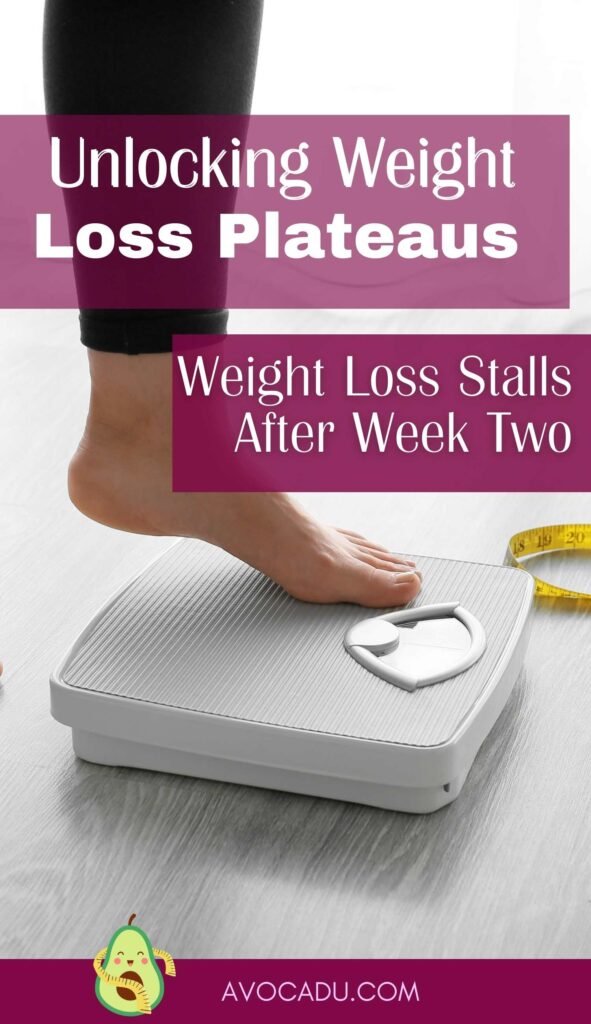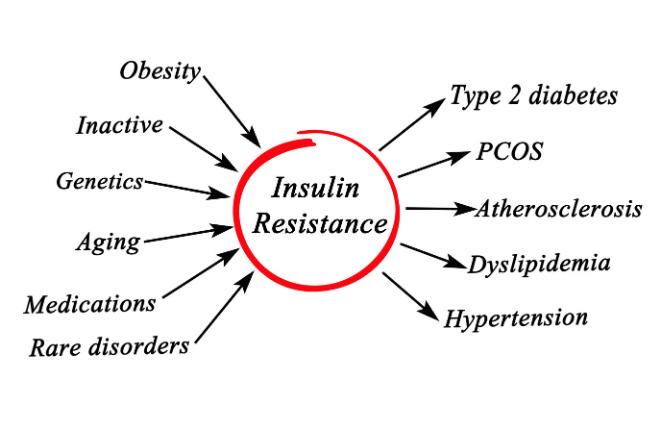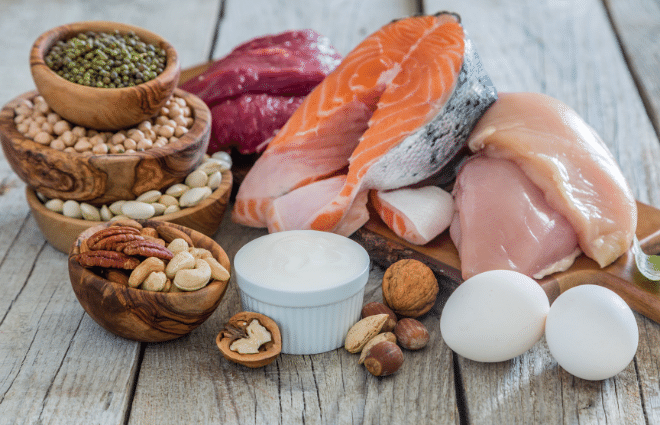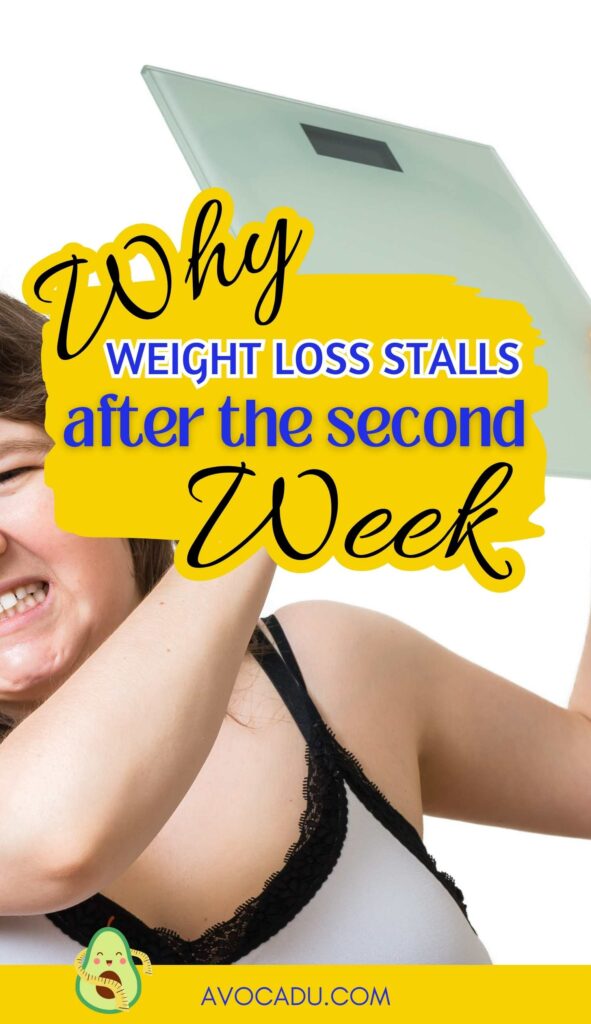Why Weight Loss May Stall After the Second Week of Dieting – The Truth
When you start a new diet, that first big drop in weight is pretty exciting!
You might even lose as much as ten pounds or so in your first week to ten days. (Party dance!)
You’re celebrating, weighing yourself at least once a day, telling everyone you know about this great diet you found…and then without warning, the needle stops moving!
You aren’t doing anything different.
You’re still paying attention to what you eat and maybe even exercising.
But that number on the scale just won’t budge!
You’ve made sure the scale is in exactly the same spot as always, your feet are in the exact same position on the scale, and you’re wearing the same clothes (or naked just for good measure).
Hell, I even take my jewelry off sometimes just to make sure it isn’t adding any weight!
But still, that number isn’t going down.
What the actual heck??

For a lot of people, this is the point when they give up.
What’s the point of dieting and exercising if you aren’t seeing any results, right?
Wrong!
The thing is, there are almost certainly some benefits happening—you just can’t see them on the scale.
Still, if you’ve hit this point in your weight loss plan, you’re probably wondering what you need to do to get those numbers dropping again.
We did the research, and found out why you can hit a dreaded weight loss plateau just a couple weeks in—and most importantly, what you need to do to break through it.
This post may contain affiliate links, which helps keep this content free. Please read our disclosure for more info.
What are Weight Loss Plateaus?
When you first start a diet, a quick reduction in pounds is quite normal because chances are, you’ve reduced your calorie intake.
Even if you’re not counting calories, making simple changes like cutting out empty carbs, eliminating added sugar, and other healthy diet changes can cut hundreds of calories out of your diet without a second thought.
Since your body misses those calories, it starts pulling energy from other places.
It does this by releasing stores of glycogen, which is a type of carbohydrate that’s found in your liver and in your muscles.
Glycogen is partly water, and when it’s burned for energy, water is the part that is left over.
Your body then flushes that excess water out—which is what experts are talking about when they say you “lose water weight.”
So you’ll drop several pounds quickly—but when that process is done, it’s done.
Then, at the same time that you’re dropping water weight, you’re also losing fat and even a bit of muscle.
Since muscle plays a major role in keeping your metabolism revved, your metabolism will slow down a bit with that muscle loss, meaning your body is now burning fewer calories.
So even if you’re still staying true to your diet, now that your metabolism has slowed a bit, so will your weight loss. (1)
Is There Anything Good Going On?
Even if the numbers on the scale have slowed or stopped going down, making healthy lifestyle changes will help your body function better.
Unhealthy diets cause inflammation, bloating, hormone imbalances and a host of other things that cause us to gain weight to begin with.
Fixing those things will recalibrate your body, and not only help you lose the weight, but keep it off, too!
And by the way—just because your scale hasn’t changed, doesn’t mean your inches haven’t.
If you took measurements before you started your diet, now is the time to take them again!
There’s a very good chance that you have actually lost some inches, despite the disappointing numbers on the scale.
So now you have proof that you didn’t just stretch your favorite yoga pants out—they really are getting looser!
Tips to Move Past a Weight Loss Plateau
Go on a Carb Detox
Even though you’ve reduced your calories and maybe cut out certain carb-heavy foods like bread or pasta, you’re probably eating more carbs and sugars than you realize.
That’s because a lot of foods that we often think of as healthy—such as fruit, root veggies, white rice, and wheat—are actually packed with simple carbs and sugars.
Carbs and sugars fuel your hormones and can send your insulin, cortisol, thyroxine and everything else through the roof—even if you’re eating them from natural sources.
The real problem here is that it causes something called insulin resistance, and it means that your body can no longer process any carbs properly — even the healthy ones.

So it makes serious weight loss damn near impossible because you can even eat the right things but if your body can’t process it properly, it’s going to hang on to that weight for dear life.
Plus, sugars and gluten also cause bloating and water retention, which will also keep the scale from budging.
If you’re feeling skeptical, try cutting out all carbs and sugars for a week or two, and see how your body reacts.
One of our key methods that helps people lose up to 21 lbs in 21 days with our 21-Day Fat Loss Challenge is a complete carb detox (temporarily), so we know that taking this step will definitely get that scale moving again!
We’ll show you exactly how to detox from those carbs the right way — and how to reintroduce them again to maximize weight loss.
Take a Break from Eating
No, we are not suggesting you starve yourself!
We’re talking about taking small breaks (usually 16 or 24 hours) from eating, otherwise known as intermittent fasting.
These scheduled breaks from food will allow your body’s digestive system to rest and will rev your metabolism when you break your fast.
It’s especially powerful when you combine it WITH a detox (as mentioned above), which is a big part of why our clients lose as much as 7-10 pounds in their first WEEK with our 21-Day Fat Loss Challenge.
Intermittent fasting has also been shown to improve hormone balance, reduce muscle loss, and help you naturally eat fewer calories.
Most people will either fast for 16 hours each day (such as from 8pm until noon the next day), or for 24 hours on a less regular basis (usually from 5pm one day until 5pm the next day).
Make sure to eat a big, healthy meal with lots of green veggies when you break your fast to get the most out of your intermittent fasting routine!
Catch Some Z’s

Because life and trying to lose weight isn’t stressful enough, did you know that a lack of sleep can also increase your cortisol levels?
And as you just learned, higher levels of cortisol can lead to more fat!
Even just a little bit of sleep deprivation can impact cortisol, so do everything you can to get a full night’s sleep every night.
If not, you could be sabotaging your weight loss goals.
Get Back to (Weight Loss) Basics
I know this probably isn’t what you want to hear, but the science is sound on this one.
The less you weigh, the fewer calories your body needs to fuel it—and you might have already reached a point where your current calorie intake is the amount it takes to maintain your current weight.
There are only two ways around this problem: burn more energy with exercise, or eat fewer calories.
To check if your calorie count is what’s causing your weight loss to stall, use a TDEE calculator to figure out how many calories you should be eating to lose weight at your current size and activity level.
Then make a plan to either get more active, or reduce your calorie intake.
Switch Up Your Routine
Over time your muscles will adjust to whatever exercise you are doing, and that exercise becomes less effective.
You’ve probably reached a comfort zone and you’re thinking that’s great.
But if your muscles have gotten comfortable, they’re not likely burning as much fat anymore!
Instead of increasing the intensity of what you’ve been doing, try something completely different, focusing on different muscle groups.
Increase Your Protein Intake

Protein has the highest thermic effect of any food.
Put simply, your body has to work the hardest to digest protein—and when the body works harder it burns more energy (a.k.a., calories).
And if that isn’t good enough on its own, protein contains leucine, an amino acid which studies have shown to be a catalyst for burning fat. (4)
So while you can’t cut every other macronutrient from your diet and just eat proteins, hoping to lose weight fast because of it, you should up your protein intake.

Getting a Serious Plan
While the steps to busting through a weight loss plateau are simple, they are often easier said than done—especially if you don’t have a set plan!
You’ve probably been here before—lost a few pounds, maybe a dozen even…only to stall out and put the weight right back on.
You’ve probably tried more than enough pills, diets, tricks, and everything else under the sun, and that stubborn fat is still hanging on for dear life!
We created our 21-Day Fat Loss Challenge for people exactly like you—people who feel like they’ve tried everything under the sun, but just can’t shed the weight or keep it off.

Our challenge provides a step-by-step plan to help you bust through that plateau and lose up to 21 lbs in just 21 days, with far less effort than you may think!
Tons of our clients have turned it into a lifestyle diet and have lost as much as over 100 pounds with the challenge!
The best part? Besides just losing weight, the 21-Day Fat Loss Challenge was designed to heal your gut, rebalance your hormones, and retrain your tastebuds—so you’ll actually keep the weight off!
We have over 4,000 people in our private support group going through the Challenge together, and they share experiences, results, lots of recipes, and best of all, motivation to keep going!
If you’re ready to make some changes in your life, this is the ONLY place you should start. We’ll teach you exactly how to make the necessary changes in your diet and lifestyle, and how to keep them “beyond the diet.”
Click HERE to start YOUR 21-Day Fat Loss Challenge today!
And if you enjoyed this article on why weight loss may stop after the second week of dieting, leave a comment below!
